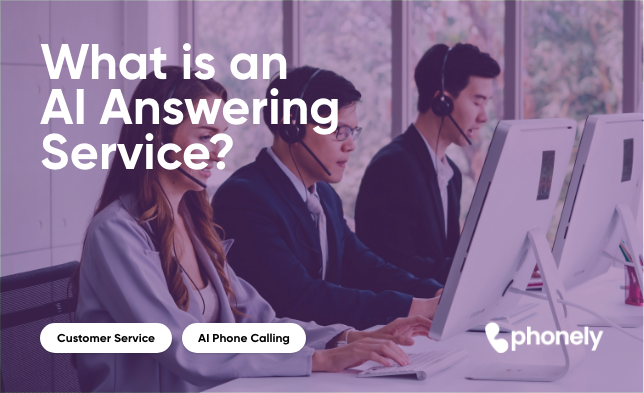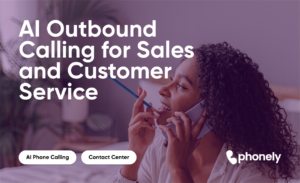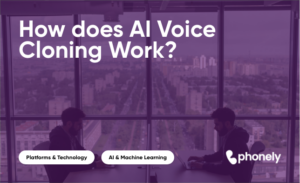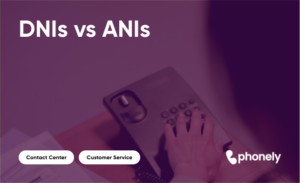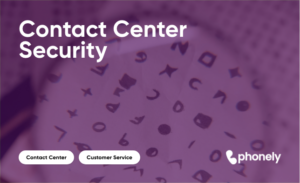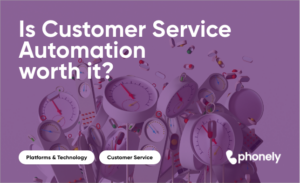An AI answering service is a more capable and cost-efficient version of a traditional answering service powered by artificial intelligence. Both a human and AI-based service can answer calls, take down messages, and schedule appointments. The big differentiator however is in the AI’s ability to learn and relay business information perfectly every single time. An AI-based system doesn’t need traditional training periods, and it’s available 24 hours and 7 days a week. Without ever getting sick. Today we are pulling back the curtain on how this tech works, what it enables, and who it is for!
Key Takeaways
- AI answering services use voice bots to handle calls, gather information and qualify leads, without the intervention of a human agent. These agents are available 24/7, all days of the year!
- An AI phone answering service uses voice recognition and natural language processing to emulate the same experience that a human agent can offer.
- Top players in industries like healthcare, retail, and hospitality are already using AI answering services to make their operations simpler and more cost-effective.
Understanding AI Answering Services
An AI answering service is a voicebot that interacts with humans using voice over the phone. Unlike traditional answering machines and IVR systems, these systems can hold a conversation with the caller. The nature of conversation is way more interactive than what a pre-recorded message can offer. Using large language models and natural language processing, these voice bots can answer the phone, help the caller with answers, take down messages, and book appointments!
Creating an AI to answer your phones is also quite quick and straightforward. With Phonely, it is as easy as adding your website, setting up a greeting, and choosing a voice. Get Started today, and cut your answering costs in half! Not sure how to proceed? Our help center has got you covered on that.
How AI Answers Customer Calls
It’s natural to wonder how AI can answer phone calls. After all, a phone call requires the people on the call to speak to and understand each other, and then respond in a context-specific way.
To do this, AI systems use advanced voice recognition technology to accurately capture and then interpret the caller’s speech using speech analytics. This also makes it possible for the AI to distinguish between accents, dialects, and speech patterns. Once the speech is received, an AI system will use natural language processing to identify what was said by the caller and generate a context-specific response using generative AI. But it’s not all haphazard or random. Most AI systems can be trained on business-specific knowledge bases or websites. This means the responses that an AI provides are relevant to what you do.
This seamless integration of voice recognition, natural language processing, response generation, and knowledge base is what makes an AI answering service so much better than a traditional answering service. These services are efficient and provide accurate responses at a fraction of the price. Next, we’ll see what an AI answering service is capable of doing.
Core Functions of AI Answering Services
An AI phone answering system is effectively an AI phone agent. Beyond the basic duties of handling phone calls, an AI agent is also capable of taking action based on the content of these calls. Think message taking, appointment booking, call routing, collecting answers to surveys and even negotiating with the customer! Let’s dive into it.
Call Routing and Handling
An AI agent can deduce the purpose of a customer’s call from the content within the phone call. With the purpose clear, the agent can then offer multiple self-help options relevant to the caller’s query. It can answer any related FAQs on that topic. Additionally, if the AI can not assist the caller, it can make the transfer to a relevant department using its contextual awareness. A person who is looking for clarity on billing will get routed to the finance department. Those struggling with setup go to IT, and the ones registering complaints go to customer support.
Scheduling Appointments and Booking
One of the most common features of an AI telephone answering service is appointment booking. Doctors, lawyers, and many other service professionals use an AI answering system to automate inbound calls.
Phonely and a few other systems on the market can access live calendars like Google Calendar and Outlook Calendar to look up, isolate, and book appointments in available spots. Using an API integration Phonely can also integrate with a calendar or practice management system of your choice! Additionally, an AI system can send outbound calls to confirm appointments and SMS messages as reminders.
Voicemail and Message Taking
An AI phone answering service is excellent for taking messages and recording voicemails. You don’t need to hear a voicemail or read a lengthy transcript of a call just to find what you need. An AI-powered service can generate key points, and call highlights for all calls. It can also predict customer intent and emotion from the tone of their voice. Detail and summarization at this scale is simply impossible with any traditional answering service or virtual receptionist provider.
Benefits of AI Answering Services
The benefits of an AI phone answering service/AI receptionist extend far and wide. Let’s take a closer look at each and see if an AI-based solution is right for you.
Cost Efficiency
To kick things off, using AI means that you are not using a human being at the front desk or in customer service roles. This immediately saves the cost of salaries, staff breaks and paid time off. Additionally, using APIs, an AI virtual receptionist can connect to the same systems that a human receptionist would use. This makes workflows and processes smoother. This cost efficiency makes AI systems lucrative for both small businesses and corporations.
That being said, it’s important to understand that an AI phone answering service can’t completely replace human sentiment and compassion. Medical and financial use cases will always require some level of human involvement. Even then an AI can act as a buffer between callers and agents by answering FAQs and smartly routing calls. This reduces average handle times and improves first-call resolution rates on the whole.
24/7 Availability
One of the most popular use cases that we see at Phonely is after-hours answering services, where customers use AI to handle incoming calls after they’ve closed for the day or the week. Soon they make Phonely their full-time answering system. Primarily because an AI-based system is available 24/7 and does not get tired, or sleep. This means most service queries can be resolved immediately, even during odd hours of the night. A 24/7 support line can be a game changer for your business.
Enhanced Customer Satisfaction
It’s natural to think that an AI would be less human, and therefore provide a sub-par experience to the caller. In our experience, it’s quite the opposite. People actually prefer talking to an AI because they are quick and efficient. An AI provides accurate responses to customers, in a tone of voice that is always happy to help! This combined efficiency, consistency, and accuracy ultimately improve customer satisfaction.
Most customers don’t find it necessary to speak with a human just to book an appointment or check the status of their orders. As long as the AI can perform a basic task and can connect the caller to a human when needed, customers are satisfied.
Industries Leveraging AI Answering Services
The constant availability of AI answering services allows businesses to respond to customers in different time zones, ensuring that no call goes unanswered. Healthcare, retail, and hospitality are the first ones to hop on the AI bandwagon.
Healthcare
In healthcare 24/7 patient support is not an optional extra, it’s a requirement for any individual clinic or hospital that is trying to set a benchmark for service quality. An AI phone answering service in these applications acts as a buffer by handling basic requirements like appointment booking, business information, procedure information, and even initial consultations! This reduces the admin workload for the front desk, while also helping doctors and nurses focus on providing the best care to their patients.
Imagine a new patient who has filled out a new patient form over the phone, shared their concern upfront with an AI answering system, and then booked an appointment. When this patient walks through the doors of the clinic, they can directly go see a doctor who already has all the background he needs! Additionally, by integrating these with practice management software, follow-ups, and appointment reminders can all be automated.
eCommerce Retail
Retail businesses often handle order inquiries, product FAQs, order tracking, and customer outreach for feedback and data collection. These tasks are highly repetitive and ripe for automation with an AI system. Shoppers/buyers can call in, and ask an exhaustive set of questions about products and their orders, and the agent on the other end would never get frustrated. Its also incredibly cost-effective to have an AI working the phone rather than a human being.
This has somewhat leveled the playing field in terms of the customer support offered by large corporations and small businesses. Now even small business owners can offer 24/7 customer support to their customers without much overhead.
Hospitality
Hospitality businesses are using AI systems to manage booking, suggest getaways, and act as travel agents or concierges. Making inquiries and reservations at hotels and restaurants no longer requires human beings. These standardized processes with clear benchmarks for success work well with AI-based systems.
Hospitality, healthcare, and retail are not the only examples. Several industries are using AI to automate their customer interactions, and this trend will continue to grow.
Integration with AI Answering Services
A good AI answering service lives and dies by the integration support it offers. Having and excellent voice engine, and LLM for your service is great. But if it can’t interact with the right tools that you use, what good is it anyway?
Customer service is incomplete without a CRM. An AI answering service must integrate with your CRM. This helps the agent have some context of previous customer interactions, and make updates to the CRM once the customer is contacted again. Keeping your AI and customer service efforts is impossible without a CRM. Integration with CRM tools will also provide you with a central database to monitor call outcomes and the overall success of your AI answering service.
We have built Phonely to integrate with some of the top industry tools like Google Calendar, GoHighLevel, and HubSpot. Additionally, we support API integrations within our apps, which you can use to connect virtually any software to Phonely! And if it’s needed, we also support integrations via Zapier and Make.com.
Future of AI Answering Services
We believe that in a few years, 95% of all phone calls will be answered by AI. Everything from answering customer questions to appointment booking, and order tracking; nearly all business phone operations will use AI voice assistants in one way or another. That being said, humans will remain a key part of customer service, but they will only handle delicate and high-stakes interactions like medical emergencies and large financial dealings. Businesses that adopt AI phone assistants today will experience significant efficiency gains, that will make it possible for them to reach more customers, and as a result, expand and scale their operations. See how Phonely can get you there!

